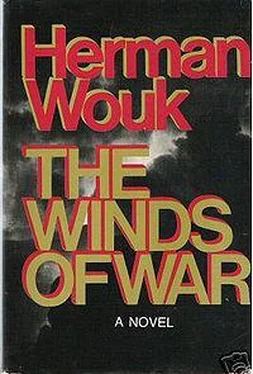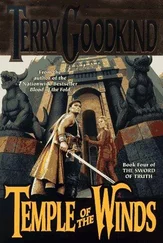Herman Wouk - The Winds of War
Здесь есть возможность читать онлайн «Herman Wouk - The Winds of War» весь текст электронной книги совершенно бесплатно (целиком полную версию без сокращений). В некоторых случаях можно слушать аудио, скачать через торрент в формате fb2 и присутствует краткое содержание. Год выпуска: 1971, Издательство: Collins, Жанр: Историческая проза, на английском языке. Описание произведения, (предисловие) а так же отзывы посетителей доступны на портале библиотеки ЛибКат.
- Название:The Winds of War
- Автор:
- Издательство:Collins
- Жанр:
- Год:1971
- ISBN:нет данных
- Рейтинг книги:4 / 5. Голосов: 1
-
Избранное:Добавить в избранное
- Отзывы:
-
Ваша оценка:
- 80
- 1
- 2
- 3
- 4
- 5
The Winds of War: краткое содержание, описание и аннотация
Предлагаем к чтению аннотацию, описание, краткое содержание или предисловие (зависит от того, что написал сам автор книги «The Winds of War»). Если вы не нашли необходимую информацию о книге — напишите в комментариях, мы постараемся отыскать её.
About the Author
Herman Wouk's acclaimed novels include the Pulitzer-Prize winning
;
;
;
;
;
; and
.
The Winds of War — читать онлайн бесплатно полную книгу (весь текст) целиком
Ниже представлен текст книги, разбитый по страницам. Система сохранения места последней прочитанной страницы, позволяет с удобством читать онлайн бесплатно книгу «The Winds of War», без необходимости каждый раз заново искать на чём Вы остановились. Поставьте закладку, и сможете в любой момент перейти на страницу, на которой закончили чтение.
Интервал:
Закладка:
“Why, I hope so. Sometime during this war.”
“I mean tonight.”
“It’s hard to say. We were supposed to sortie yesterday. Maybe we will today. There’s a rather headless feeling in this fleet.”
“I completely understand. I feel sort of headless myself.”
“It’s still there on your shoulders, Dad.”
“Well, I wouldn’t want to give an emphatic nod.”
This made Warren laugh. It was more like his father. “Don’t take no from Captain Larkin, now. Better keep these car keys, in case I do leave.”
“Right. And in case you do — good luck and good hunting, Warren.”
The father and son looked each other in the face, and parted without more words. Victor Henry went straight to the Cincpac communications office and looked through the dispatches. In the long garbled battle report of the evening before about Cavite, he saw the Devilfish listed as sunk.
He went to Jocko Larkin’s office to wait. It was a quarter to seven, and nobody was there yet, not even the yeoman. Pug unceremoniously took a lounge chair in the inner office; Larkin would have done the same in an office of his. The large wide-windowed room had a panoramic view — the sunny sugarcane slopes, the blue ocean beyond the anchorage, and the hideous black-coated harbor, with its grotesque fringe of defeat and damage.
Victor Henry felt ill: nauseous, chilly, yet greasily perspiring. Consuming a bottle of brandy in a few hours had done this, of course; but after the letters from Rhoda and Madeline, the only safe immediate recourse had been oblivion. The news that the Devilfish was lost had struck an almost numb man, scarcely surprising him. As soon as he had heard of the Cavite attack, he had half expected evil tidings about his son. When things went bad, his long experience told him, they went very bad; and he seemed to be falling into a gulf of bad luck without a bottom.
But there was always a bottom to hit; meantime, he groggily thought the main thing was to hold himself together. He did not know, after all, that Byron was really dead or injured. The Devilfish might not even be sunk. An excited first report was unreliable. The idea was to brace himself and hang on to hope until the straight word came.
On his wife and his daughter, however, the straight word was in. Rhoda wanted to divorce him and marry Fred Kirby; and his daughter had entangled herself with her employer, had probably been committing adultery, and it all might be in the newspapers any day. These were unchangeable facts, however hard to grasp. He had to absorb them and somehow act on them.
Far from harboring any relieved notion that he might be free for Pamela Tudsbury, Pug now first understood how hopeless his romance with the English girl had been, and what a strong bond tied him to his wife. That Rhoda did not feel this tie too — that she could write and mail such a letter with her usual breezy exclamation marks and underlinings, cheerily blaming herself and her long dislike of a Navy wife’s existence, praising Pug up almost as a saint, yet telling him that after more than twenty-five years she wanted out, to go to another man — this was a stab from which it would be difficult to recover. He felt it in his gut, a throbbing, weakening wound. Rhoda’s letter was coy about the big question: exactly what had been going on between her and Fred Kirby? Here Victor Henry was torn two ways: by his hard good judgment, which told him that of course his wife had been opening naked thighs to the other man, probably for a long time; and by his love for his wife and his own self-love, which protested that such a thing was impossible. He clung to the dim fact — it was a fact — that Rhoda hadn’t said it in so many words.
Because what Victor Henry now wanted was to get her back. He felt himself desperately in love with Rhoda. Much of this was injured ego — he well understood that — but not all. She was half of him, for better or worse; the weld was a quarter of a century old; she was irreplaceable in his life, with her arms, her mouth, her eyes, her sweet particular graces and ways; she was beautiful, desirable, and above all capable of surprising him. It had taken a nasty shock to drive these blunt truths home. He would have to court this woman again! He could not greatly blame her for the affair; he had already decided that in a brandy-soaked fog before passing out. How close had he not come to writing exactly the same kind of letter? Nor, strangely, did he have strong feelings about Fred Kirby. The thing had happened to those two people, much as it had to him and Pamela; only Rhoda had gone over the edge. The pictures in his mind made him sick with revulsion; but in cold honesty he had to look at the event in this rational way.
Rage at Madeline’s boss perhaps did him some good. One reason for surmounting this crisis was to seek out and confront Hugh Cleveland. Regret cut at Pug for his softness in letting her stay in New York. At least he could have tried to order her back to Washington; she might have gone. Now this celebrated swine’s wife was threatening to sue him for divorce, naming his twenty-one-year-old assistant — unjustly, Madeline swore in a long vehement paragraph, but that was hard to swallow. Unlike Rhoda’s letter, Madeline’s was no bombshell. What could have been more predictable for a girl adrift alone in New York; if not with Cleveland, then with some other man? Madeline had been shot down like a dove flying over a rifle range.
“Pug! I tried all yesterday afternoon to find you. Where the hell were you hiding!”
Jocko Larkin came striding in, a scarlet-faced freckled fat four-striper indistinguishable from twenty others. He closed his door, tossed his cap on a hook, and said into his squawk box, “No calls, Amory.”
“Aye aye, sir.”
“Well!” Larkin sat back in his swivel chair, gat hands locked behind his head, surveying his classmate with a penetrating eye. “Good to see you. That’s hell about the California. She’d have had a great skipper.”
“Well, Jocko, I’d say my misfortune’s lost in the shuffle.”
“Pug, who gave you my message? I left it at half a dozen places.”
“What message? Nobody. I came here to see you.”
“What about?”
“Orders.”
“That’s what I wanted to see you about.” Larkin looked over his shoulder, though nobody else was in the room, and turned off his intercom. “Pug, Admiral Kimmel is going to be relieved. At his own request.” Jocko almost whispered this, adding with a sarcastic little grin, “Like Louis the Sixteenth had himself shortened by a head, at his own request. His successor will be Admiral Pye — for how long, we don’t know, but Pye wants to start shaking up the staff. Let’s face it, something smells here. Luckily, the personnel section has nothing to do with war alerts. It didn’t happen on my watch. But it happened. Admiral Pye wants you for Operations — now hold it, Pug!” Jocko Larkin held up a hand as Victor Henry violently shook his head. “Let me give you my judgment. This is as great a break as a man in our class can have. Just remember there are six Iowa class battleships building now, due for commissioning in twelve to twenty months. The greatest warships in the world. You’ll probably get one after this.”
“Jocko, give me a ship.”
“I’m telling you, you’ll undoubtedly get one.”
“Now. Not in 1943.”
“No can do, Pug. Listen to me. You don’t say no to Cincpac! Operations is a marvellous opening for you.”
“Where’s Admiral Pye’s office?” Henry got to his feet.
“Sit down, Pug.” Larkin rose too, and they stood glaring at each other. Larkin said, “You son of a bitch, you never could play football or tennis, and you can’t think straight either.”
Читать дальшеИнтервал:
Закладка:
Похожие книги на «The Winds of War»
Представляем Вашему вниманию похожие книги на «The Winds of War» списком для выбора. Мы отобрали схожую по названию и смыслу литературу в надежде предоставить читателям больше вариантов отыскать новые, интересные, ещё непрочитанные произведения.
Обсуждение, отзывы о книге «The Winds of War» и просто собственные мнения читателей. Оставьте ваши комментарии, напишите, что Вы думаете о произведении, его смысле или главных героях. Укажите что конкретно понравилось, а что нет, и почему Вы так считаете.












